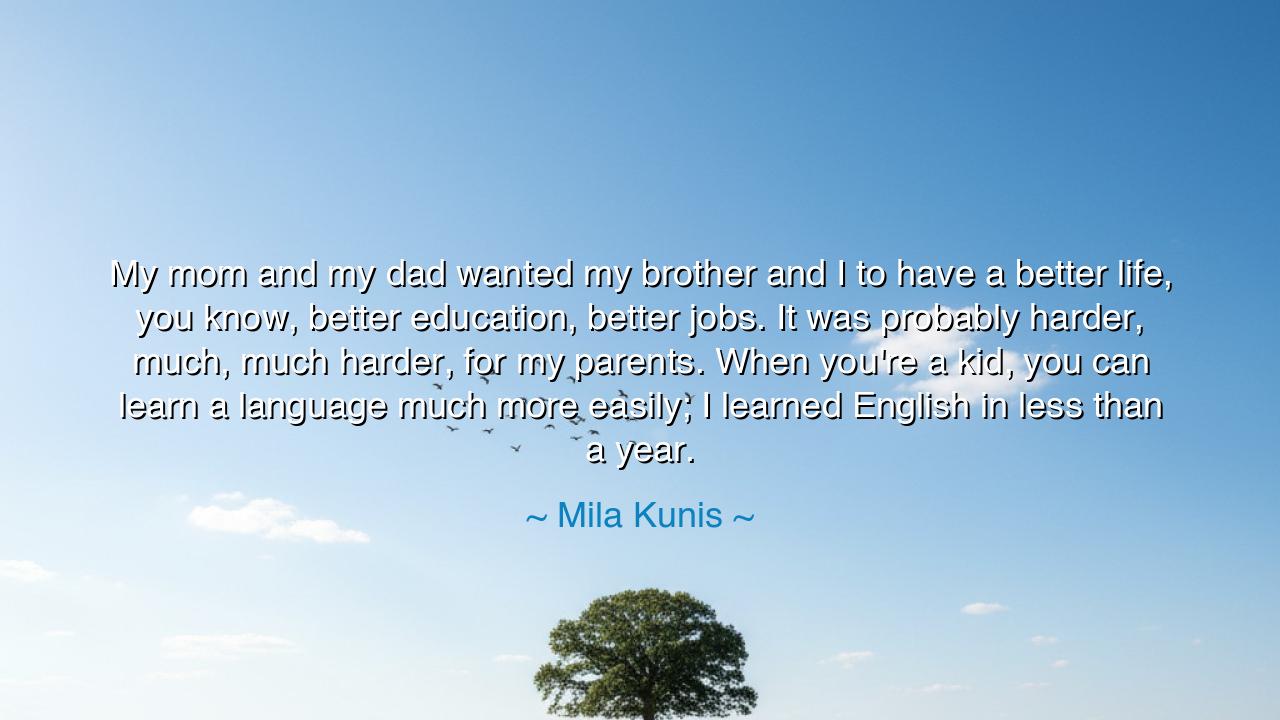
My mom and my dad wanted my brother and I to have a better life
My mom and my dad wanted my brother and I to have a better life, you know, better education, better jobs. It was probably harder, much, much harder, for my parents. When you're a kid, you can learn a language much more easily; I learned English in less than a year.






When Mila Kunis said, “My mom and my dad wanted my brother and I to have a better life, you know, better education, better jobs. It was probably harder, much, much harder, for my parents. When you're a kid, you can learn a language much more easily; I learned English in less than a year,” she spoke with the humility of one who has looked back and recognized the hidden sacrifices that built her path. Beneath these words lies not just gratitude, but a profound acknowledgment of the timeless cycle of love and struggle between generations. Her story, like countless others throughout history, reminds us that every dream fulfilled in the present was once a burden carried quietly in the past — upon the shoulders of those who gave everything so their children might stand taller.
This reflection arises from the immigrant’s journey — a story as ancient as civilization itself. From the exiles of Mesopotamia to the voyagers of the New World, families have crossed seas and deserts not for themselves, but for the hope of their children. Kunis’s parents, like many before them, traded comfort for uncertainty, language for silence, and familiarity for the unknown, all in the pursuit of something sacred: the possibility of a better life. What she learned easily as a child — English, culture, belonging — came at the price of their endurance, their unspoken heartbreaks, and their invisible strength. They bore the storm so their children could live in the sun.
The ancients would have honored such a tale. In every culture’s mythology, the parents who sacrifice for the next generation are likened to pillars holding up the world. The Greek Titan Atlas, condemned to bear the heavens upon his shoulders, mirrors this eternal struggle — the parent holding the weight of a world their children will inherit. Yet unlike Atlas, who was punished, these parents choose their burden willingly. They carry it with dignity, often without complaint, because love makes endurance holy. Mila Kunis’s recognition that “it was probably harder, much, much harder for my parents” is not merely a sentiment of empathy; it is a revelation — an awakening to the sacred truth that the ease of one life is often purchased by the hardship of another.
In her words about language — “I learned English in less than a year” — there is another layer of meaning: the innocent adaptability of youth versus the painful effort of adulthood. The child absorbs and becomes; the parent struggles and perseveres. The young cross borders with ease, but the old must carry memory across them — memory of home, of identity, of loss. This is the paradox of migration and of love itself: the very thing that wounds one generation gives freedom to the next. And in that exchange — that sacred imbalance — lies the unbroken chain of human progress.
History offers countless reflections of this truth. Consider Andrew Carnegie, who rose from a penniless immigrant child to one of the richest men of his time, forever attributing his success to his parents’ courage in leaving Scotland for America. Or think of the millions who fled war, persecution, or poverty, carrying nothing but their will, who built new lives so their children could learn, speak, and dream freely. They are the unseen architects of their children’s destinies, the silent heroes of every family’s story. To understand their struggle is to understand the true cost of comfort — to see, as Kunis did, that every fluent word, every opportunity, every joy is built upon a foundation of unseen labor.
There is a deep moral wisdom in her words: the call to remember and to honor. The modern world often celebrates the individual, the self-made success, but forgets the hands that lifted that self into being. Gratitude, in its truest form, is not a passing emotion — it is a way of life, a way of seeing. To realize, as Kunis did, that one’s ease was bought through another’s hardship is to begin living with humility and reverence. The child who understands this truth becomes the adult who gives back, who strives not just for success, but for meaning.
So let this be the lesson for future generations: never forget the roots that nourish your growth. Whatever comfort you inherit, know that it was paid for by struggle — and that your task is not to feel guilty for it, but to use it well. Learn from those who endured, and let their sacrifice awaken compassion in you. For the measure of a person is not in how high they rise, but in how deeply they remember who carried them there.
In the end, Mila Kunis’s quote is not just a reflection of family, but a hymn to gratitude, resilience, and inheritance. It teaches that every act of love — especially the quiet, difficult kind — becomes the seed of another’s strength. And when the child, grown and wise, looks back with understanding, the circle of sacrifice closes — transformed into the eternal flame of remembrance, burning brightly for all who came before.






AAdministratorAdministrator
Welcome, honored guests. Please leave a comment, we will respond soon